Ahrefs and SEMrush are two top SEO and digital marketing platforms (toolsets). Both platforms offer highly accurate and valuable data for setting up and running digital marketing (especially SEO) campaigns.
While at Siteefy, we use both tools simultaneously to research keywords, optimize content, and track our marketing campaigns; it can be difficult to justify the cost of doing so if you’re just starting out with your website.
So in this guide, we’re going to walk you through the differences and similarities of SEMrush and Ahrefs to help you decide which one of these two will best meet your needs.
Let’s start with a quick overview first…
Ahrefs vs SEMrush Overview
Ahrefs is an all-in-one SEO toolset that is famous for its backlink index. The Ahrefs crawler is the second most active after Google, which sort of explains why Ahrefs has the largest backlink index compared to all other SEO tools.
This is how Ahrefs is described by Ahrefs:
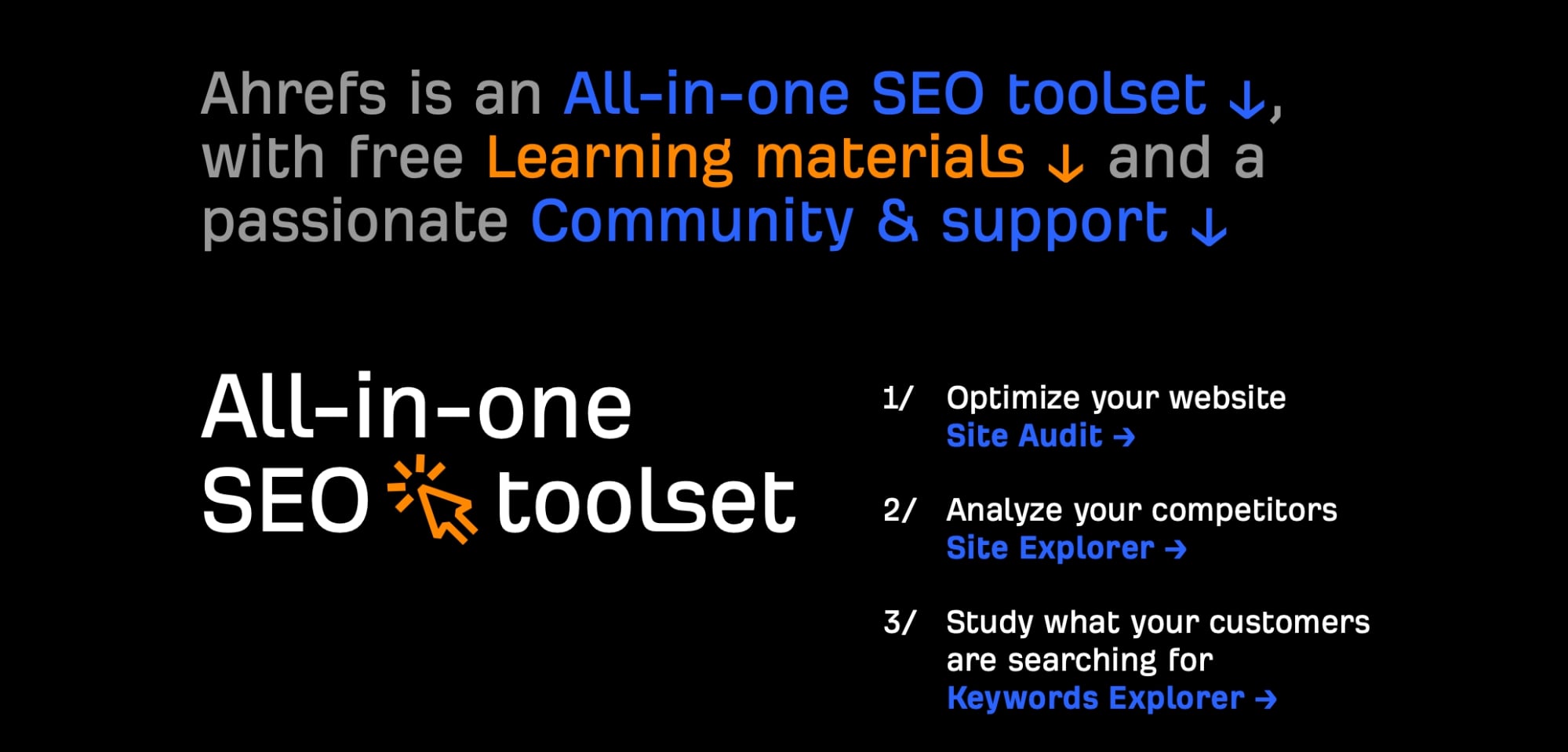
SEMrush is an online visibility management and content marketing SaaS platform (also with a huge focus on SEO) used by over 6 million marketing professionals and website owners.
It offers a total of 48 tools that cover almost everything you may need from organic and paid search to content marketing and competitor research.
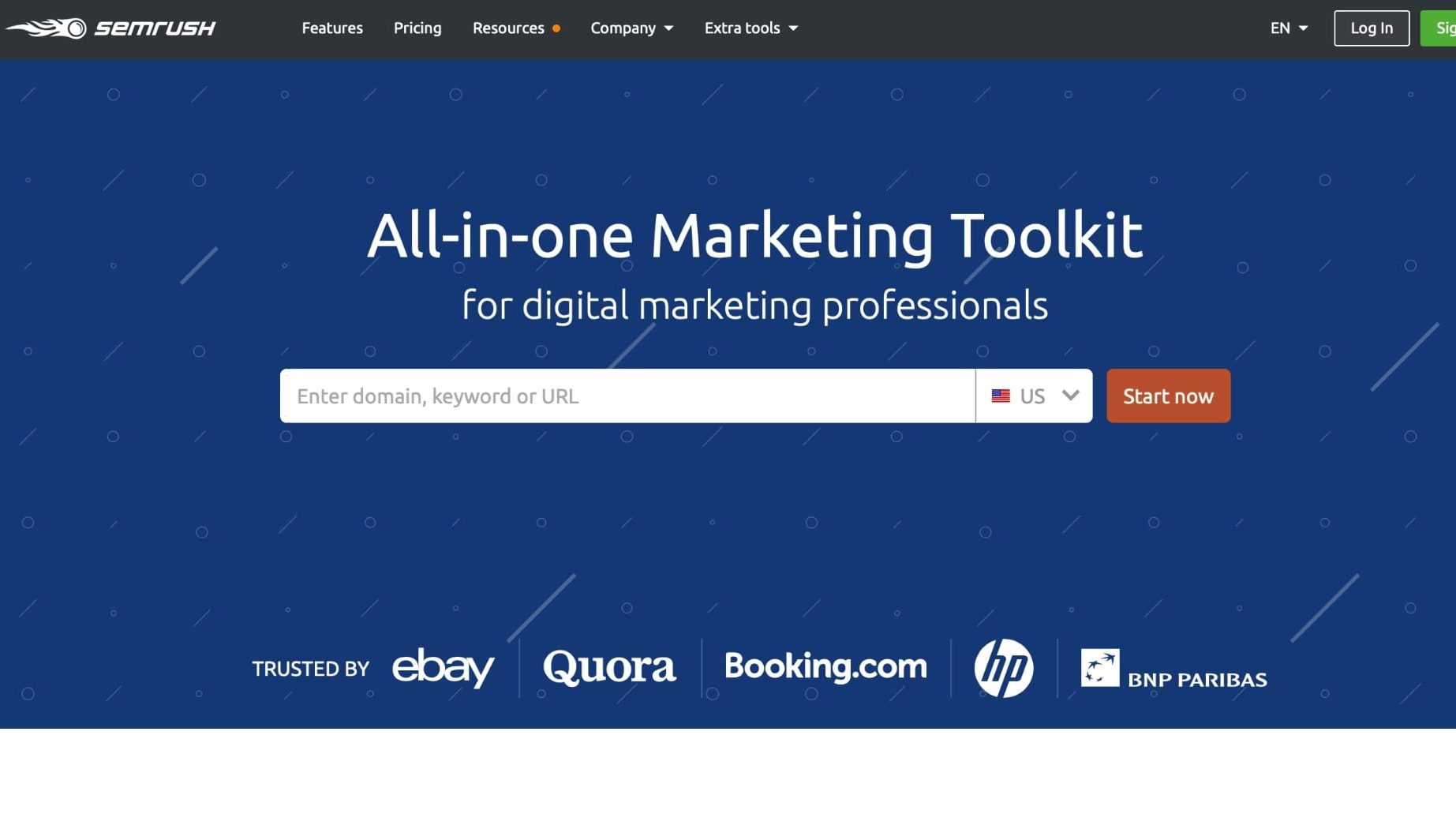
Basically, both tools gather huge amounts of data with their crawlers and combine it with third party data (like clickstream) to help users like you analyze the market for marketing purposes.
So with Ahrefs and SEMrush, you can:
- Look for relevant keywords to target with your content, based on data like search volume and keyword difficulty (KD)
- Analyze your competitors to reverse engineer their strategies
- Audit your website to find and solve technical issues
- Track your keyword rankings and measure your SEO campaigns
While Ahrefs is predominantly focused on SEO, SEMrush offers everything from SEO, PPC, Social Media, content marketing to market research tools.
So, SEMrush is a more universal toolset compared to Ahrefs.
But to keep this comparison simple, we’re going to focus on the SEO tools of SEMrush only.
Let’s quickly compare both platforms side-by-side:
Ahrefs vs SEMrush: Comparative Table
| Ahrefs | SEMrush | |
| Keyword Research Database | 7.8 Billion Keywords | 20 Billion Keywords |
| Domains Database | 185.9 million | 832 million |
| Countries Supported | 171 | 142 |
| Content Explorer | ✔️ | ✔️ |
| Social Media Management | ✖️ | ✔️ |
| Free trial | ✖️ | ✔️ |
| Pricing | $99/month | $99.95/month |
Let’s now move to the individual features…
Keyword Research
Ahrefs Keyword Explorer runs on a database of more than 7 billion keywords, supports 171 countries, and 10 different search engines (Google, YouTube, Bing, Amazon, Baidu, etc.).
You can enter up to 10,000 keywords at a time in the Keyword Explorer, and it will output all the data related to the keywords, like keyword difficulty, search volume, CPC, CPS (clicks per search), and parent topic.
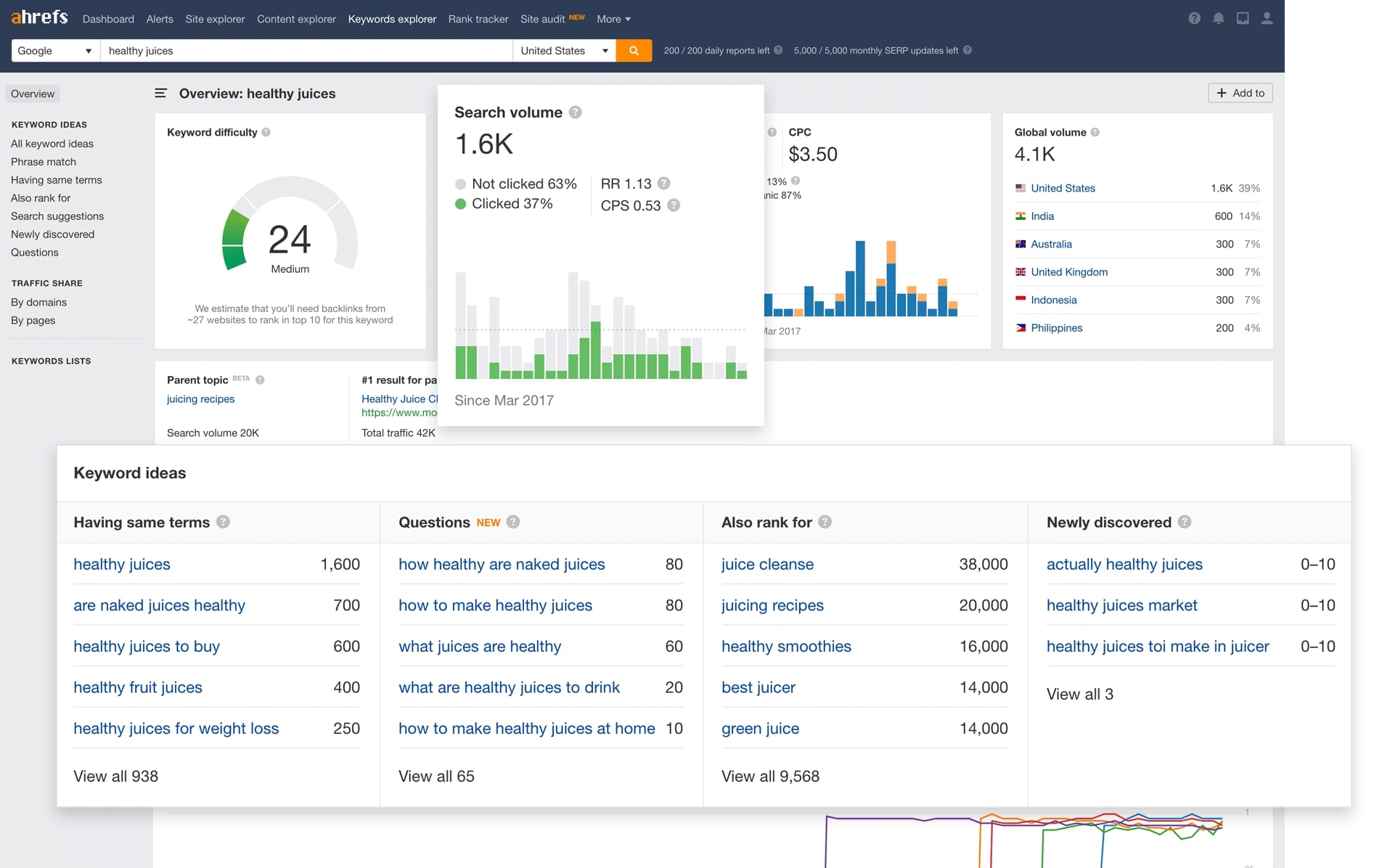
SEMrush has a similar Keyword Magic Tool based on a database of over 20 billion keywords (considerably more than Ahrefs), and it supports 142 locations.
You can filter the results in the Keyword Magic Tool according to search volume, trends, CPC, top competitors, and competitive density. It also allows you to export your selected keywords to other SEMrush tools (like Position Tracking and PPC Keyword tool) that makes the whole process super easy and streamlined.
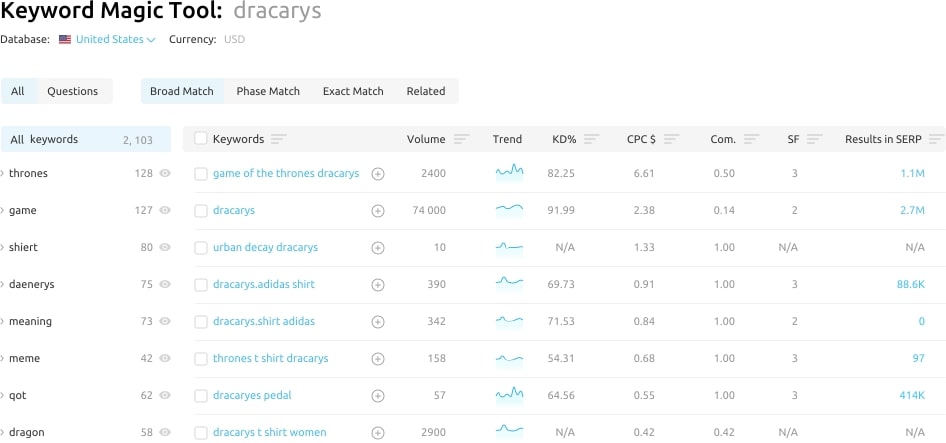
So while SEMrush has a larger keyword database, Ahrefs looks a little better in terms of usability and other keyword research features (like keyword suggestions, SERP Overview, and positions history).
Tip: Keyword research is the process of identifying words and phrases (keywords) that you can rank for in search engines like Google and YouTube (did you know that YouTube is the second most popular search engine after Google?). With keyword research, you can find keywords relevant to your business and understand the demand for specific topics to make sure your efforts are going in the right direction.
Here’s a quick video explaining the keyword research process in Ahrefs:
Backlink Analysis
Link building is a crucial part of SEO, and both Ahrefs and SEMrush provide a complete toolset for backlink analysis.
Ahrefs boasts an index of over 14 trillion live backlinks and 185.9 million domains in its Site Explorer tool.
You can enter any website URL in the Ahrefs backlink checker tool to instantly get the number of backlinks and referring domains (RDs). The tool also shows a chart through which you can monitor backlink profile growth and decline of any given website.
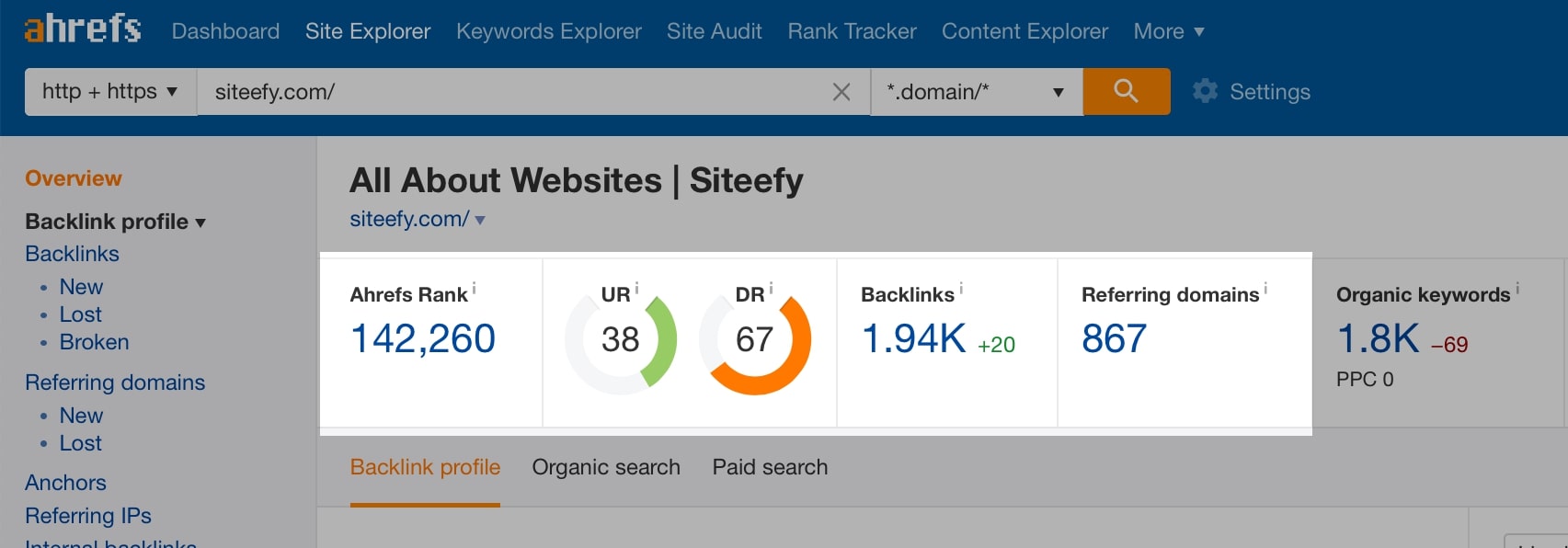
While previously, Ahrefs was considered the best SEO tool for backlink analysis, SEMrush has come a long way since then. Now, SEMrush uses a database of over 33 trillion backlinks and 832 million domains.
With the SEMrush Backlink Audit tool, you can easily look for backlink opportunities, find anchor text distribution, discover new/lost backlinks, and check the backlink types (follow, nofollow, sponsored, and UGC).
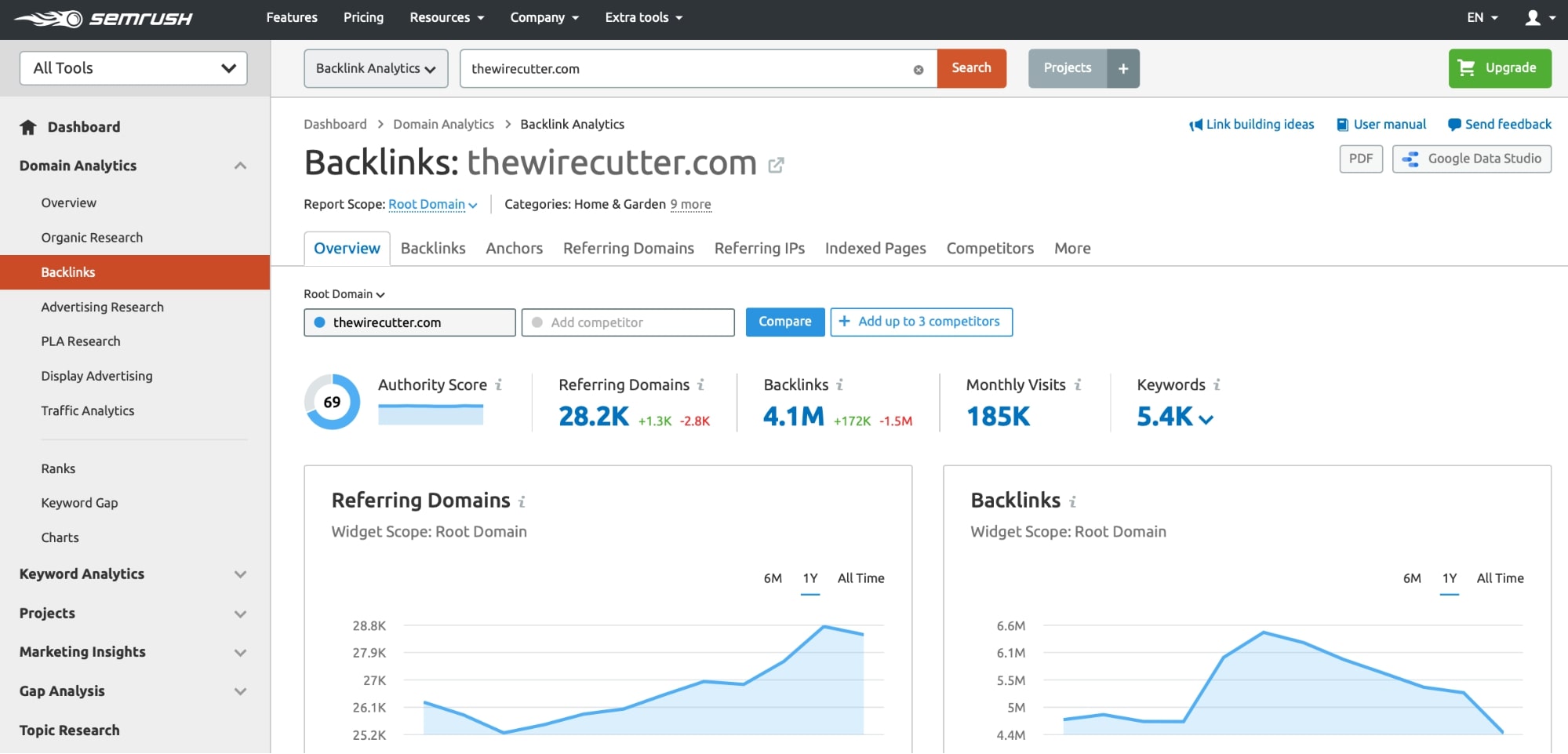
Overall, in terms of backlink analysis, we still prefer Ahrefs over SEMrush — mainly due to the reliable Ahrefs data and its ease of use (Ahrefs has got an amazing user interface).
Site Auditing
Both Ahrefs and SEMrush include a Site Audit tool that can measure the on-page and technical SEO performance of a website.
Ahrefs Site Audit tool checks websites for 100+ SEO issues like HTML tags, content quality, performance, incoming and outgoing links, external links, localization, and more!
Once the test is done, the results are presented in charts with a clear indication of errors and recommendations on fixing them.
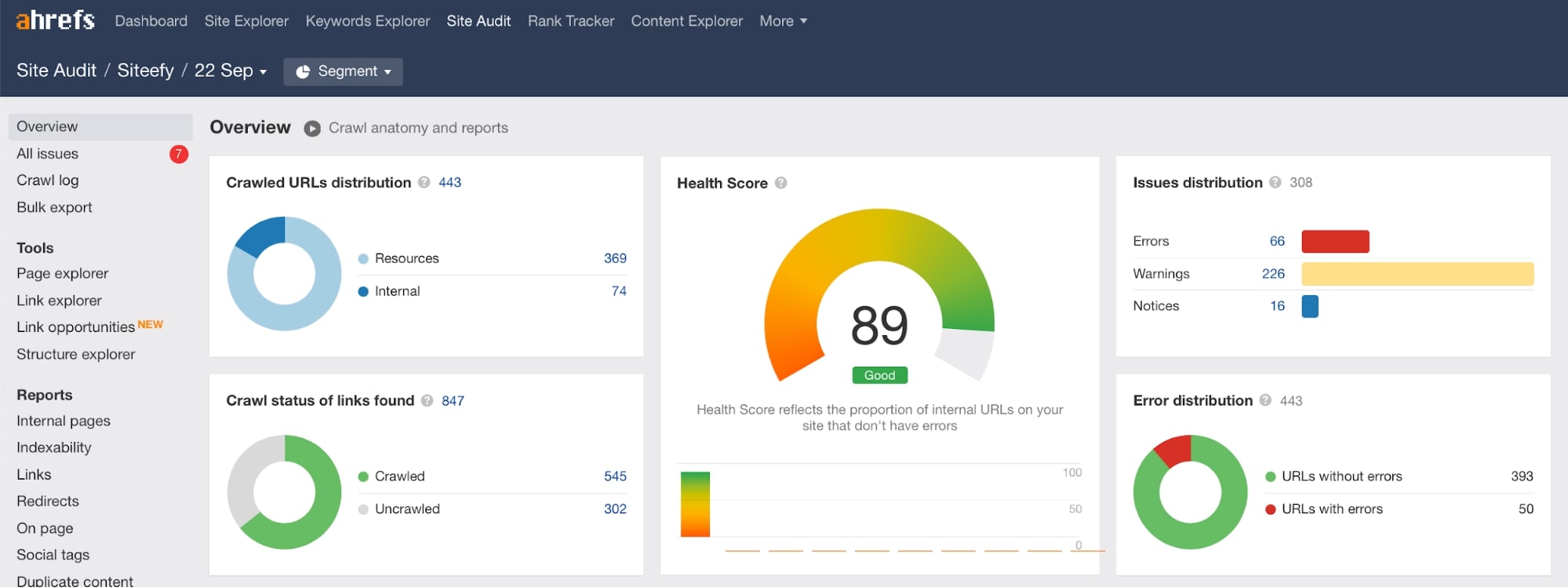
Note: While Ahrefs has an amazing user interface overall, when it comes to site audit the navigation can be a little challenging at times.
SEMrush Site Audit scans websites on over 130 technical and on-page SEO metrics to look for errors and warnings. You can also connect your Google Analytics to your SEMrush account to analyze your most important pages first.
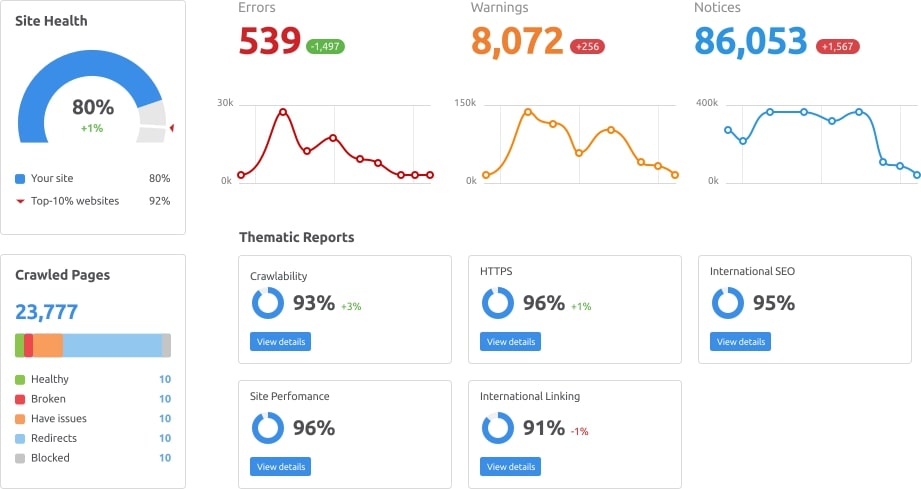
While Ahrefs Site Audit is a great tool to measure the technical status of a website, the SEMrush Site Audit tool provides more data and insightful tips to prioritize and fix all the errors and warnings.
Watch this video to learn more about site auditing in SEMrush:
Features Unique to Ahrefs and SEMrush
Now that we have compared the main features of both tools, let’s take a look at some of the unique features of Ahrefs and SEMrush.
Ahrefs Unique Features
These are a few impressive features that you will only find on Ahrefs toolset:
1. Ahrefs Webmaster Tools (AWT): This is a new addition to the Ahrefs tools which allows adding any website to Ahrefs, and receiving Ahrefs data on it for free.
With AWT, you can monitor your website’s SEO performance, analyze your backlinks data, and check organic keywords in the Ahrefs Site Explorer. SEMrush also has a similar free plan, but you can only audit up to 100 pages in that with very limited data access. In contrast, Ahrefs with AWT shows the full data to verified websites (you can verify your site through GSC or manually).
2. Broken Link Checker: One of the most famous link building techniques is broken link building, and this tool in Ahrefs is designed precisely for that purpose.
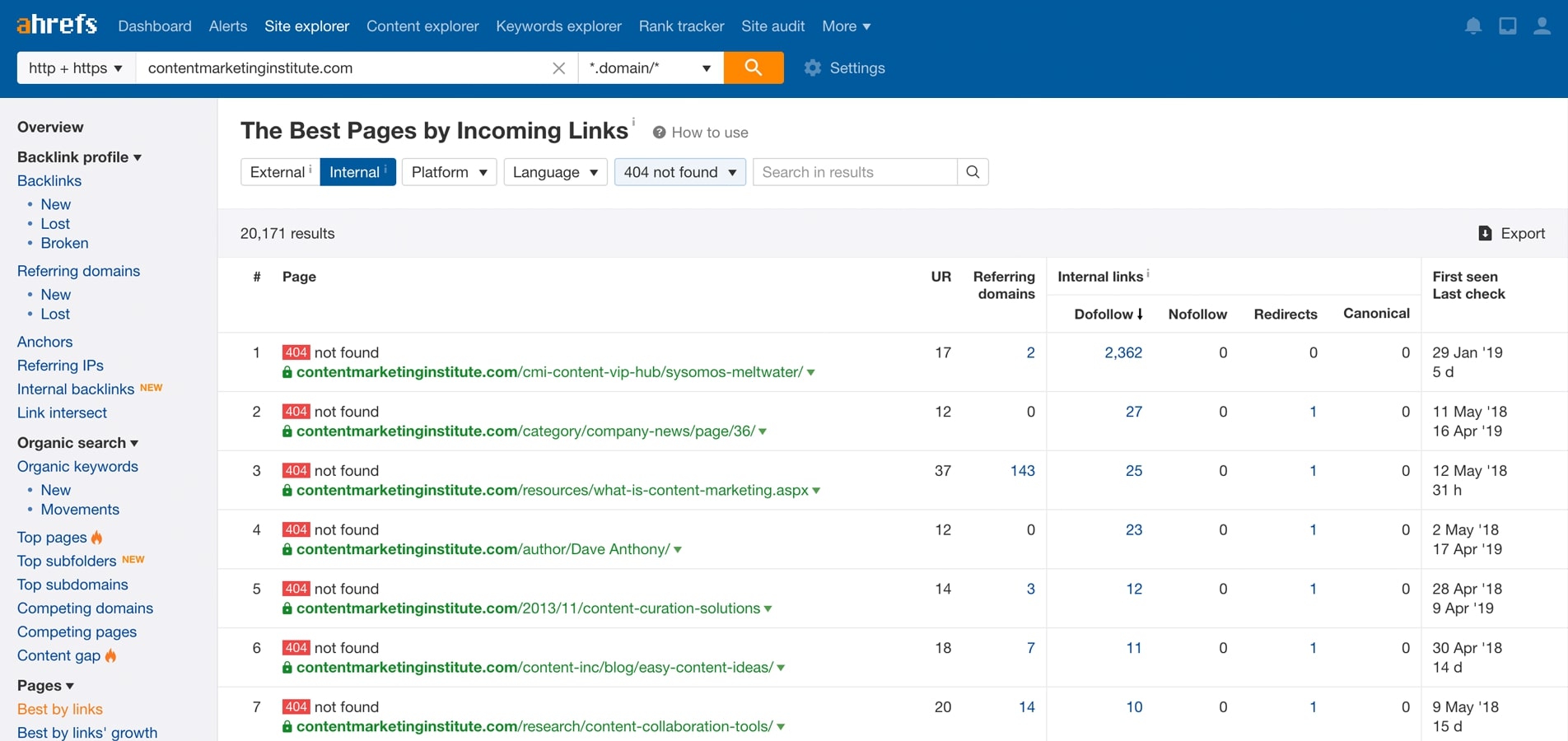
To find link opportunities, you can enter your competitor website and look for the most linked broken pages. Then you can reach out to those sites and simply offer them a link on your site (if it qualifies as a good alternative). You can also export all the data to outsource the work to a freelancer or agency.
Broken links can also be checked in Ahrefs Content Explorer.
3. SERP Checker: With the SERP Checker, you can see the Google search results in real-time from any location to evaluate the keywords. This tool also shows the estimated organic traffic for the top results and the number of keywords they rank for.
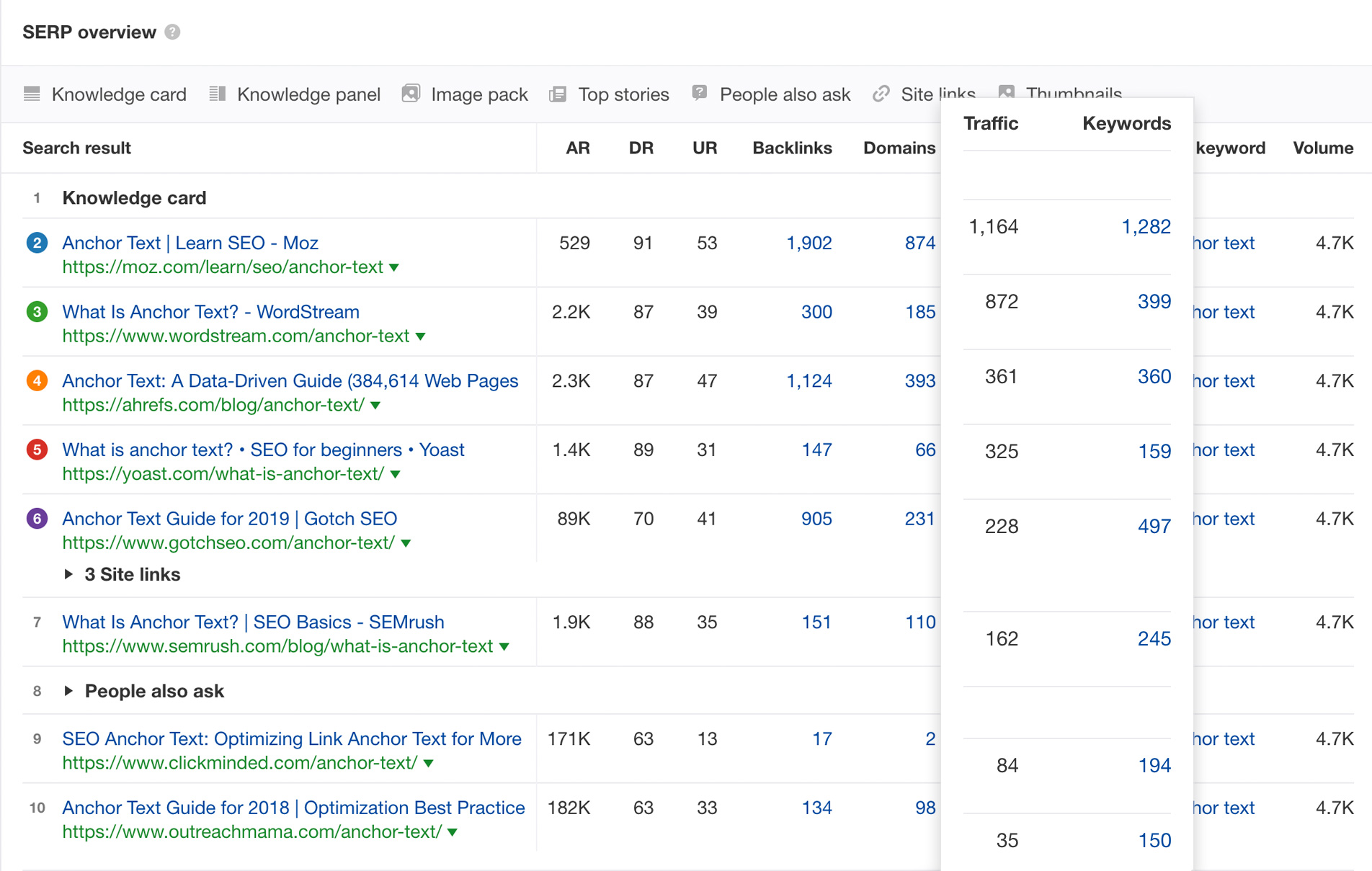
You can use this tool to understand the high traffic pages to prioritize keywords and analyze your competition. SERP analysis based on the search results traffic and keywords data is not available in SEMrush.
SEMrush Unique Features
Now, let’s see some of the amazing tools included in SEMrush that you won’t find in Ahrefs:
1. PPC Keyword Research Tools: With the SEMrush PPC keyword toolkit, you can find the right keywords for all your SEO and PPC campaigns. This toolkit has a lot of features that Ahrefs don’t have:
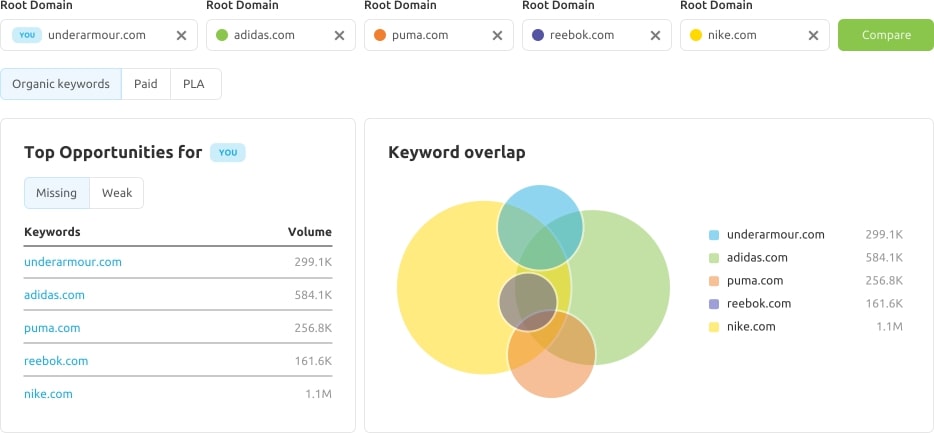
- You can use the CPC Map tool to evaluate locations in terms of the CPC and search demand for your keywords
- You can cross-match negative keywords to avoid duplicates while setting up your campaigns
- Compare keywords of websites side by side to get an overview of your competitor’s visibility
SEMrush has a lot more PPC features that you will find useful for SEO work as well. That is why SEMrush is a tool of choice for many marketers and website owners.
2. SEO Content Template: With this tool, you can generate a brief template for your target keywords and get SEO recommendations based on the top 10 ranking results in Google.
The recommendations include semantically related keywords, competitor backlinks data, suggested word count, and the average readability score of the top 10 URLs.
3. Backlinks Audit: One major benefit of the SEMrush Backlink Audit tool is that it has a Toxic Backlinks feature that can analyze and display the toxicity score of every backlink pointing to a website.

SEMrush algorithm automatically checks all the backlinks you have against 45+ toxicity markers to spot the spam links. After identifying the toxic backlinks, you can submit the Disavow file to Google Search Console right from the SEMrush Backlink Audit tool.
This is a super useful SEMrush tool to keep a check on the health of a website’s backlink profile.
Pricing
The pricing starts at $99 per month for Ahrefs and $119 per month for SEMrush. But SEMrush starter plan includes a lot more compared to Ahrefs.
For example: with SEMrush, you can export up to 10,000 results per keyword report, but Ahrefs has a limitation of only 1,000 results per report.
Now, SEMrush offers 3 main plans:
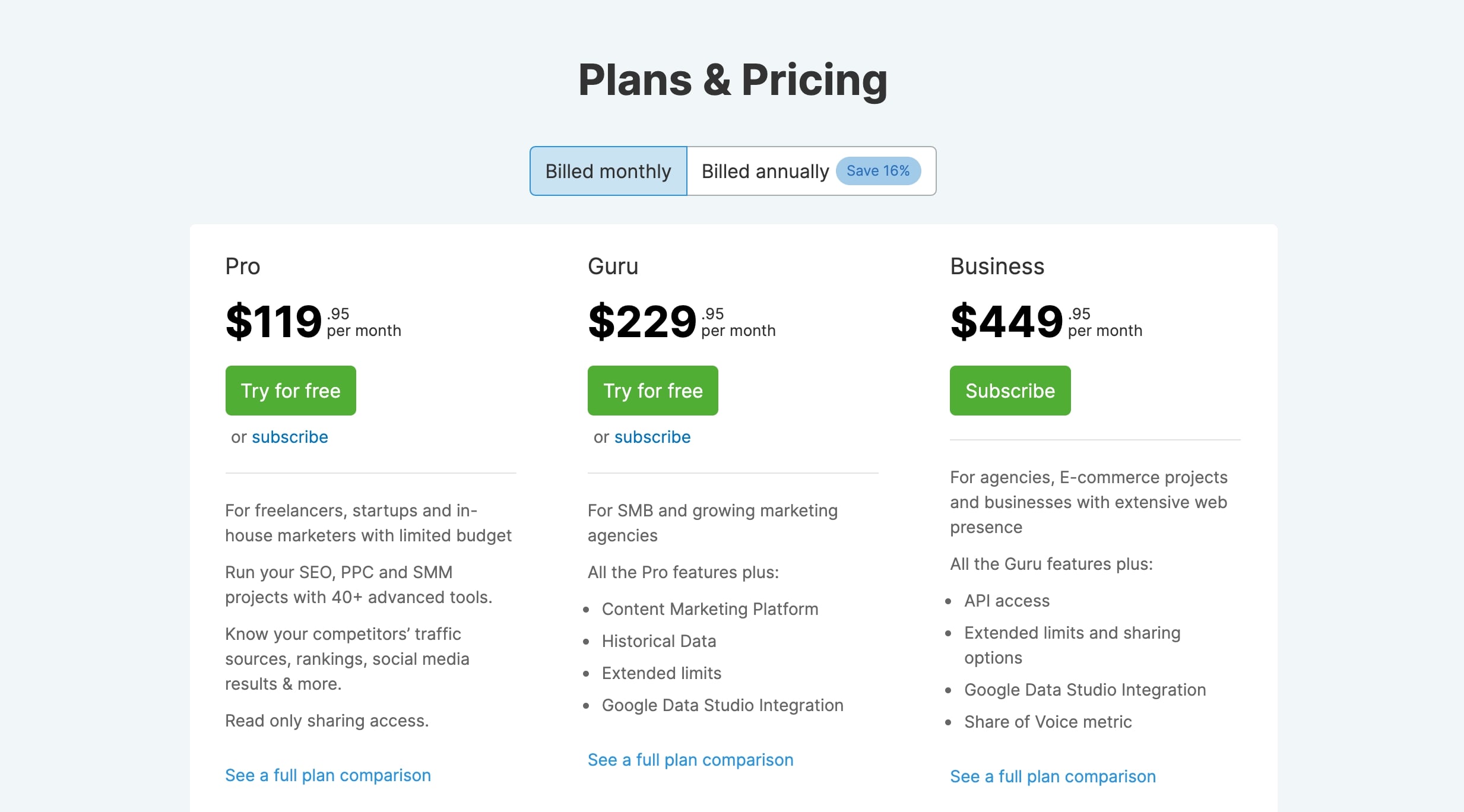
- Pro at $119.95 per month.
- Guru at $229.95 per month.
- Business at $449.95 per month.
You can get a discount of 16% if you subscribe to the yearly plans.
Ahrefs has 4 different plans:

- Lite — $99 per month.
- Standard — $179 per month.
- Advanced — $399 per month.
- Agency — $999 per month.
If you subscribe to any of the yearly Ahrefs plans, you will get 2 months free.
Finally, when it comes to value for money, SEMrush is the clear winner here.
With the base plan at $119/month, SEMrush offers fantastic SEO tools, plus PPC, social media, and market research functionality to cover all your website-related needs. Basically, anything you may need for your SEO and digital marketing.
Conclusion
So, to sum up, based on everything we have discussed above, if we had to choose one tool, we would probably go for SEMrush.
SEMrush is an excellent tool for SEO, plus you get access to a more extensive toolset that covers everything in digital marketing — all at the same pricing as of Ahrefs.
But if you’re looking for a tool exclusively for SEO purposes, then Ahrefs might be what you are looking for.
It is a well-respected tool in the SEO community, and Ahrefs site and keyword explorer tools make it very easy to analyze competition, research keywords, and measure traffic stats. Plus, Ahrefs is a bit easier to navigate and use compared to SEMrush.
Overall, both tools are great and we enjoy working with each of them here at Siteefy.
What you can do to decide for yourself:
Before you decide between these two absolutely fantastic platforms, consider giving each one a try!
Sign up for a free 7-day trial of SEMrush and test all of its toolsets. Ahrefs also offers a trial, but it’s a paid option and is offered at $7 for 7 days.
Check also:

